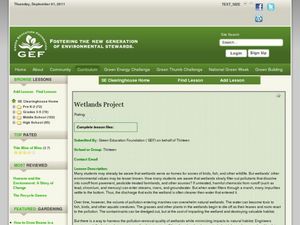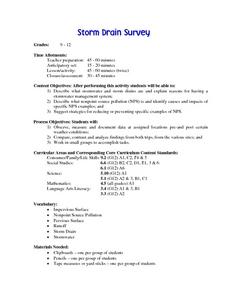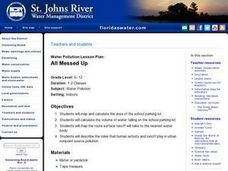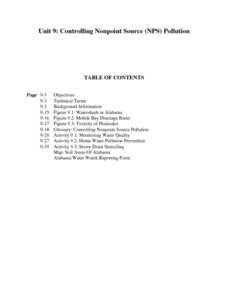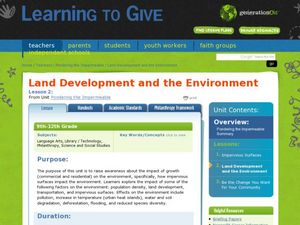Curated OER
Abundant Lakes
Students define lake life zones. They define stormwater runoff and its effects on lakes. They identify the relationship between decaying substances and water pollution. They construct a freshwater food web.
Curated OER
Water Pollution Lesson Plan: All Messed Up
Students map and calculate the area of the school parking lot and then the volume of water falling on the school parking lot. They map the route surface runoff will take to the nearest water body and describe the roles that human...
Rivanna Regional Stormwater Education Partnership
Does It Soak Right In?
Which materials are best for groundwater runoff, and which are best for percolation? Discuss the water table with several experiments about different types of soil, pollution, precipitation, and filtration. The experiments assign roles...
Curated OER
Wetlands in a Pan
Fifth graders explore the wetlands to discover its benefits in removing pollutants in the water. In this wetlands lesson, 5th graders discuss how stormwater wetlands are created to purify water. Students test the water.
Curated OER
Water Above the Ground
Students create a river drainage basin using a plastic tub, sand and a pitcher of water. They simulate the flow of water through the basin then add chocolate syrup to model what would happen if stormwater pollution entered the basin.
University of Florida
Protecting Our Water Resources
Teach young environmentalists to protect their planet's resources with a set of interactive experiments. Kindergartners and other youngsters learn about watersheds and the water cycle, while older elementary learners focus on fertilizer...
Curated OER
Restoring and Protecting Chesapeake Bay and River Water Quality
A professional and comprehensive presentation on Chesapeake Bay water quality is in store for your ecology class. If you live in the Chesapeake Bay region and want to get learners involved in conservation efforts, this slide show will do...
Curated OER
Storm Drain Survey
Learners describe what stormwater and storm drains are. They explain reasons for having stormwater management system. They describe nonpoint source pollution and identify causes and impacts of it.
Curated OER
Eye On Conservation Drainage Basin
Students are able to describe the importance of wetland vegetation. They describe the impacts human activities have on water systems. Students compare and contrast the effect of different soil types on water filtration.
Curated OER
The Other Water Cycle
Students examine human impacts on the water cycle. They compare/contrast the permeability of various materials for the purpose of engineering landscape drainage systems, and answer discussion questions.
Curated OER
Lesson 3 - Water Above the Ground
Students define surface water, drainage basin or watershed. They investigate what affects runoff in a drainage basin. They complete lab sheets and worksheets.
Rivanna Regional Stormwater Education Partnership
Invisible Passengers
How does water pollution affect the organisms living in the water? Use three science experiments to examine how erosion and other pollutants can affect water quality. Each experiment focuses on a different aspect of pollution and...
Curated OER
All Messed Up
Pupils begin the experiment by mapping and calculating their school parking lot. They calculate the volume of water falling on the lot and map the route the water runoff takes. They discuss the roles that humans play in affecting water...
Curated OER
Wetlands Project
Young scholars discover how wetlands filter out contaminants before they can reach other bodies of water. In groups, they design and build a model of a stormwater wetland. They test the water quality and inform their classmates about...
Curated OER
Controlling Nonpoint Source Pollution
Students examine factors affecting water quality. They test water in a local body of water to determine its quality. They collect data and continue monitoring the water monthly. They assess water quality in the home and on the farm.
Curated OER
Land Development and the Environment
Students examine the relationship between land development and the environment. In this environmental stewardship lesson, students explore how population density, land development, transportation, and impervious surfaces take their toll...
Curated OER
Non-Point Source Pollution
Students study non-point source pollution. They research the concept of bio-degradation and/or Nutrients/Fertilizers and discuss how non-point source pollution impacts the environment. Afterwards, they participate in an interactive...
Curated OER
Lesson 9 - Along Our Coast
Learners study the benefits of estuaries. They construct a saltwater food web, and complete worksheets and a quiz.
Curated OER
Watershed Model
Young scholars view a presentation of water and land and how we need to protect our water resources. In this water lesson plan, students discuss how we rely on water, and complete activities in all subjects related to water.
Curated OER
What is an Estuary?
Young scholars define the terms estuary and watershed. They conduct an experiment to determine the density differences between fresh and saltwater. They examine the salinity distribution of the Peconic Bay Estuary.
TeachEngineering
Teach Engineering: Natural and Urban "Stormwater" Water Cycle Models
Students apply their understanding of the natural water cycle and the urban stormwater water cycle, as well as the processes involved in both cycles to hypothesize how the flow of water is affected by altering precipitation.
TeachEngineering
Teach Engineering: Natural and Urban Stormwater Water Cycles
Through an overview of the components of the hydrologic cycle and the important roles they play in the design of engineered systems, students' awareness of the world's limited fresh water resources is heightened. The lesson lays the...
Other
Nc Department of Energy and Natural Resources: What Is Stormwater Pollution
When it rains, some of the rainwater soaks into the ground, and part of it flows over the ground and directly into creeks, streams, or rivers. This water that runs off into the river is called runoff, or sometimes stormwater runoff....
Other
Catawba Riverkeeper: Threats to Our Lake and Water
The most common problem on the Catawba River and its lakes is sedimentation. Sediment carried by stormwater runoff from construction sites in North Carolina has been documented as the leading source of non-point source pollution to...





